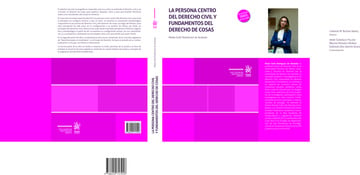Palabras clave: Derecho civil, persona, derechos de cosas, derechos reales,
Resumen
El objetivo de esta monografía es responder qué es y cómo se entiende el Derecho civil y, en concreto, el Derecho de cosas, para explicar, después, cómo y para qué enseñar Derechos reales a los estudiantes del Grado en Derecho. En esta obra se presta especial atención a la persona como centro del Derecho civil, pues toda la disciplina se configura entorno a ella. Es decir, se examina la concepción antropológica subyacente en las normas de Derecho civil y del Derecho de cosas a lo largo del tiempo, pues esta concepción ha sido clave en su configuración y su sentido. Se ofrece, por tanto, un concepto del Derecho civil y Derecho de cosas desde una triple perspectiva: histórica, dogmática y antropológica. A partir de ahí, se examina su configuración actual, con sus características, y su prospectiva, analizando los principales retos a los que tendrá que hacer frente. En la segunda parte del libro, se planteará la estructura y desarrollo de la concreta asignatura de ?Derechos reales e inmobiliario?, en el Grado de Derecho. Se hace un estudio de su contextualización curricular, normativa e institucional. La tercera parte de la obra se dedica a exponer la visión personal de la autora a la hora de plantear la docencia de esta asignatura, teniendo en cuenta siempre las bases y concepto de la asignatura previamente establecidos.
Keywords: Civil Law, person, Property Law, Real Rights.
Abstract
The objective of this monograph is to address what Civil Law is and how it is understood, specifically focusing on Property Law, and subsequently explain how and why to teach Real Rights to students pursuing a Law degree.
This work places special emphasis on the person as the center of Civil Law, as the entire discipline is structured around them. In other words, it examines the anthropological conception underlying the norms of Civil Law and Property Law over time, since this conception has been key to their configuration and meaning. Therefore, the book provides a concept of Civil Law and Property Law from a threefold perspective: historical, dogmatic, and anthropological. Based on this foundation, it examines their current structure, characteristics, and future prospects, analyzing the main challenges they will face.
In the second part of the book, the structure and development of the specific subject â??Real and Real Estate Rightsâ?? within the Law degree program are addressed. This includes a study of its curricular, regulatory, and institutional context.
The third part of the work is devoted to presenting the author's personal perspective on teaching this subject, always considering the foundational principles and concepts of the subject established earlier.

 Continuar con Google
Continuar con Google Continuar con Facebook
Continuar con Facebook